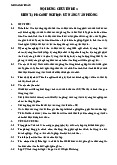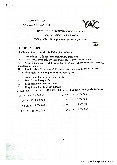



















Preview text:
Chapter 1
The role of accounting in business 2/14/2022
201107 - The role of accounting in business 1 Learning objectives
• Define the main types of accounting
• Describe how decision makers use accounting information
• Describe professional career opportunities in accounting
• Describe how accounting is regulated in Australia
• Explain the role of ethics and sustainability in accounting
• Identify the three main types of business organisations 2/14/2022
201107 - The role of accounting in business 2 Learning objectives
• Describe the basic accounting principles and their applications in business
• Describe the accounting equation and its function
• Apply the accounting equation to analyse transactions
• List the different financial statements and demonstrate how they are prepared and used
• Use financial statements to evaluate business performance and make decisions 2/14/2022
201107 - The role of accounting in business 3
1.1. Defining accounting
Accounting encompasses the information system that
• measures business activity
• processes the data into reports
• communicates the results to decision makers
It is divided into two main types:
1. Financial accounting: provide information for ________
decision markers, such as outside investors and lenders.
2. Managerial accounting: focuses on information for
________ decision markers, such as business ____________ 2/14/2022
201107 - The role of accounting in business 4
1.2. Decision makers: The users of accounting information • Business owners • Investors • Creditors
• Government regulatory agencies • Tax authorities • Non-profit organizations
• Other users, e.g. employees and labour unions 2/14/2022
201107 - The role of accounting in business 5
1.3. Accounting regulation 2/14/2022
201107 - The role of accounting in business 6
1.4. Corporate social responsibility
• Financial reports prepared by accountants play a central part in informing financial decisions
• The ICAA and CPAA have a joint code of ethics for
professional accountants as part of their professional standards
• It includes the following principles -
Integrity ===> to be honest, fair and sincere -
Objectivity ===> to avoid conflicts of self-interest and bias -
Professional competence and due care - Confidentiality -
Professional behavior ===> compliance with the law 2/14/2022
201107 - The role of accounting in business 7
1.5. Accounting measurements: Concepts and principles
• The primary objective of external financial reporting is to
provide useful information for making investment and lending decisions
• Useful information must be relevant, valid and reliable 2/14/2022
201107 - The role of accounting in business 8
1.6. Types of business organisations 2/14/2022
201107 - The role of accounting in business 9
1.7. Accounting measurements: Concepts and principles
• Basic measurement concepts and principles include - Entity concept - Accounting period concept -
Cost principle (revalue => fair value (~ market value)) - Matching principle - Profit recognition principle - Conservatism principle - Going concern assumption 2/14/2022
201107 - The role of accounting in business 10
1.7. Accounting measurements: Concepts and principles
• The entity concept: an accounting entity is an organization that stand apart
from other organization and individuals as a separate economic unit for the purpose of some decision.
• The accounting period concept defines the unit of time for which accounting data is collected
• The cost principle states that accounting measures are based upon transaction costs
• The matching principle relates inputs and outputs of goods and services to one another 2/14/2022
201107 - The role of accounting in business 11
1.7. Accounting measurements: Concepts and principles
• The profit recognition principle states that profit should be
recognized when the sales and any other revenues or gains
relating to the relevant activity are earned and can be reliably measured
• The conservatism (or prudence) principle constrains
management’s natural optimists.
• The going concern assumption assumes that the business as a
whole will continue operating for the foreseeable future 2/14/2022
201107 - The role of accounting in business 12 Quick Check
1. Accounting standards in Australia are formulated by the:
a. Australian Accounting Standards Board (AASB) b. CPA Australia (CPAA)
c. The Institute of Chartered Accountants in Australia (ICAA)
d. Australian Securities and Investments Commission (ASIC) 2/14/2022
201107 - The role of accounting in business 13 Quick Check
2. Which concept or principle is based on the belief that
accountants should record transactions at amounts that can be verified? a entity concept b cost principle c matching principle d going concern concept 2/14/2022
201107 - The role of accounting in business 14 Quick Check
3. The accounting principle that states recording expenses and
revenues in the same period in which they occur: a/ Historical cost b/ Matching c/ Revenue recognition d/ Going-concern 2/14/2022
201107 - The role of accounting in business 15 Quick Check
4. Accounting is the information system that: a measures business activity
b communicates the results to decision makers c processes data into reports d all of the above 2/14/2022
201107 - The role of accounting in business 16 Quick Check
5. Which of the following is least likely to be a user of a business' financial information? a Australian Taxation Office b customers c creditors d investors 2/14/2022
201107 - The role of accounting in business 17 Quick Check
6. Which of the following accounting principles allows for an
organization’s activities to be divided into specific time
periods such as a month, a quarter or a year?
a/ Revenue Recognition Principle b/ Matching Principle
c/ Accounting Period Principle d/ Business Entity Principle 2/14/2022
201107 - The role of accounting in business 18 Quick Check
7. T&T Corporation completed a project for a client. The $8,000
fee for this project was billed to the client in 2014, but will be
collected in 2015. Is this revenue recorded in 2014? Which
principle could have been applied? a/ Historical cost b/ Matching c/ Profit recognition d/ Going-concern 2/14/2022
201107 - The role of accounting in business 19
1.8. The accounting equation
It measures the resources of a business and the claims to those resources Assets Liabilities Equity 2/14/2022
201107 - The role of accounting in business 20




